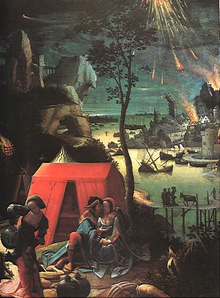Lot (Bible and Koran)
Lot ( Hebrew לוֹט, loːt, "shell" ) is a biblical figure. According to the Book of Genesis ( Gen 11: 27-31 EU ) he was the son of Haran and thus a nephew of Abraham , with whom he immigrated from Mesopotamia with family and flocks in Canaan , where they settled: Abraham as pastoral patriarch, Lot as townspeople in Sodom on today's Dead Sea ( Gen 13.12 EU ).
Lot in the Tanakh and the Old Testament
In the Tanach , the Hebrew Bible, Lot is the main character in the story of God's judgment on the city of Sodom ( Gen 19.1–29 EU ). When two angels are looking for righteous people in the sinful city of Sodom, who are to be saved from the impending destruction of Sodom by God, Lot takes the two strangers into her home. The Sodomites demand the angels for themselves to attack them, whereupon Lot, out of desperation, offers his virgin daughters to the pack. The angels save the family from the mob, lead them outside the city and tell them to flee. As Lot's wife, whose name is not mentioned in the Bible, looks back during the flight contrary to the angels' prohibition, she freezes into a pillar of salt . This is possibly a rock formation or a rock efflorescence near Ĝebel Usdum south of the Dead Sea, which due to its striking shape founded a local legend .


Lot flees to Zoar with his daughters . When he saw smoke rising from the city of Sodom the next morning, he was afraid, according to the divine commandment, he fled to the mountains and lived there in a cave. His daughters then say that there is no man in the country who can give them offspring, they make their father drunk, lie down with him and become pregnant. So Lot becomes the father and at the same time the grandfather of the two sons Moab and Ben-Ammi , who emerged from this connection and from whom the peoples of the Moabites and Ammonites arise ( Gen. 19.30-38 EU ). According to historical-critical exegesis , this is a polemical story of origin about the neighboring peoples who are hostile to the Israelites .
Lot in the New Testament
According to the account of the Gospel of Luke, Jesus referred to the events of Lot and Sodom: “And it will be exactly as it was in the time of Lot: they ate and drank, bought and sold, planted and built. But on the day Lot left Sodom, it rained fire and brimstone from the sky and they all perished. It will be the same on the day when the Son of Man is revealed ”( Lk 17.28–30 EU ). In Lk 17.32 EU , Jesus particularly reminds of the fate of Lot's disobedient wife: "Think of Lot's wife!"
Lot in Islam
Lot (Arabic Lūṭ ) is also often mentioned in the Koran , especially in the different versions of the Lot story (parallel passages ) in Suras 7: 80–84, 11: 77–83, 15: 58–77, 26: 160 -175, 27: 54-58, 29: 28-35 and 54: 33-39. These verses are about Lot's standing up against the shameful behavior of the Sodomites ( called Lot's people in the Qur'an ), who are being destroyed by a divine judgment - as is Lot's unbelieving wife, while he and part of his family are saved by Allah . Lot is in the Koran a “messenger from God” ( rasūl ) and is one of the “servants” and “chosen” of God. The short narratives that make up the Qur'anic Lot story essentially correspond to Lot's depiction in the Hebrew Bible . However, the Quran text does not speak of incest within Lot's family and thus does not speak of such offspring. The Qur'an also speaks of Lot being one of those who first found the right path through Abraham and only afterwards was it sent (see 29: 26–30). Abraham also experienced the near annihilation of Lot's people before them (cf. 11: 74–76). This in turn presupposes that both of them have passed in a timely manner. Furthermore, Lot was mentioned by later prophets as a warning (cf. 11:89).
An overall narrative based on the Koran, the Bible and legends about Lot and the destroyed cities (the names Sodom, Arabic Sadūm, and Gomorrah, ʿAmūrā, are also used here) can be found in the narrative works called Qisas al-Anbiyāʾ .
See also
literature
- Karen Engelken: Lot. In: New Bible Lexicon. Volume II H – N, Benziger, Zurich, Düsseldorf 2008, ISBN 3-545-23075-9 , Sp. 668-670.
- Ulrich Hübner, Klaus Koenen : Moab / Moabiter. In: Michaela Bauks, Klaus Koenen, Stefan Alkier (eds.): The scientific biblical dictionary on the Internet (WiBiLex), Stuttgart 2006 ff.
- Bernhard Heller, Georges Vajda: Lūṭ. In: Encyclopaedia of Islam. New Edition. (12 volumes, Leiden, 1960-2004), Volume 5 (1986), pp. 832-833.
Web links
Individual evidence
- ↑ Karen Engelken: Lot. In: New Bible Lexicon. Volume II H-N, Col. 669.
- ^ Ulrich Huebner, Klaus Koenen: Moab / Moabiter. In: Michaela Bauks, Klaus Koenen, Stefan Alkier (Eds.): The Scientific Biblical Lexicon on the Internet (WiBiLex), Stuttgart 2006 ff.
- ↑ The number in front of the colon gives the number of the sura (sūra) , behind the colon are the numbers of the verses ( āyāt ) .

